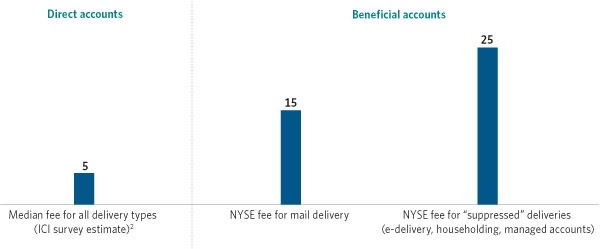ICI Calls for Saving Fund Shareholders’ Money by Reforming Fees for Distributing Fund Materials
Current system stifles competition, resulting in higher costs for fund investors
Washington, DC; November 1, 2018—The Investment Company Institute (ICI) called on the Securities and Exchange Commission (SEC) to overhaul the fee framework for distributing fund regulatory material. ICI filed a comment letter to respond to a request for comment by the SEC on the framework regulating fees that intermediaries charge funds for distributing disclosure materials—such as shareholder reports and prospectuses—to fund investors.
“The current processing fee system for distributing mutual fund materials is broken, providing a near-monopoly for the predominant vendor with little to no incentive to reduce processing fees,” said ICI President and CEO Paul Schott Stevens. “The result is unnecessarily high costs for fund shareholders. Funds pay three to five times as much to distribute materials through intermediaries as they pay when they can distribute materials directly—an excess cost caused by lack of competition and lack of incentives to control costs.
“ICI commends the SEC for looking into this issue and urges the Commission to pursue additional reforms that will help create a more competitive marketplace for delivering fund materials and significantly reduce costs for fund shareholders.”
ICI’s letter presents survey data showing that funds pay substantially more to distribute materials through intermediaries than to distribute materials directly. In many cases, the primary distribution vendor charges multiple fees to deliver a single document—and even more fees just to email a report.
Current Fee System Lacks Incentive for Competition, Results in Higher Fees
Under SEC rules, funds bear the obligation and the expense to ensure that shareholders receive shareholder reports, prospectus updates, and other materials. When shareholders hold a fund through financial intermediaries, like broker-dealers, fund shares are usually held collectively in omnibus accounts, and the fund has no direct contact with the shareholders. In such cases, the intermediary distributes the materials. SEC rules require the fund to reimburse the intermediary for reasonable expenses incurred in forwarding materials to beneficial owners of fund shares. These costs are fund expenses borne by shareholders—not by the fund adviser.
Intermediaries generally outsource the forwarding of fund materials to a fulfillment vendor that then invoices the fund to pay the expenses. According to ICI’s letter, this system creates a disconnect between the intermediary that negotiates the vendor fees and the fund that pays the vendor’s bill, reducing the incentive for competitive pricing.
The New York Stock Exchange (NYSE) has set a fee schedule with maximum rates for what constitutes “reasonable” delivery expenses (i.e., processing fees). Even when the intermediary negotiates a rate with the vendor that is lower than the NYSE-set maximum rate, the fund does not receive the lower rate. Rather, when the intermediary negotiates a lower rate, the vendor commonly bills the fund for the maximum rate, and then remits a portion of the fund’s payment to the intermediary, referred to as a “remittance.” The lack of properly aligned incentives leads to higher prices, and remittances also limit the opportunity for market competition to develop on its own.
As a result, funds pay significantly more to distribute fund materials through intermediary accounts compared with funds held directly with the fund (direct-held accounts), where vendors compete to offer funds attractive pricing for delivering fund materials.
ICI based its comments on extensive coordination with its membership and a survey of more than 1,700 mutual funds from 50 ICI members. The survey found that the median fund pays three times as much in processing fees for mailing the same shareholder report to an intermediary-held account as compared to a direct-held account. The median fund pays five times as much to email a shareholder report to an intermediary-held account as compared to a direct-held account. More information on the disparity in fees paid by funds for intermediary-held and direct-held accounts can be found on page 5 of ICI’s letter.
ICI Member Survey Indicates Processing Fees That Funds Pay for Direct Accounts Are Significantly Less Than NYSE Processing Fees
Processing fees for delivery of fund shareholder reports to direct1 and beneficial accounts, cents

1 Data on processing fees for direct accounts were obtained from a survey of 1,704 mutual funds from 50 ICI members.
2 Median is based on funds that mailed or suppressed at least 100 shareholder reports for their direct accounts.
Sources: ICI tabulations of data from ICI members, and the schedule of NYSE processing fees
ICI’s letter also details the fund industry’s long-running efforts to reform the delivery fee system, bring more competition to the delivery of shareholder materials, and reduce shareholder costs.
SEC Can Facilitate Greater Competition
ICI’s letter recommends two regulatory options that would permit funds to negotiate with vendors and eliminate the need for a fee schedule. Under either approach, intermediaries would be required to provide to funds, on request, the shareholder information that funds need to deliver regulatory materials directly. Funds could then select their own vendors for delivery and negotiate competitive prices on behalf of fund shareholders.
If the SEC does not completely overhaul the fee framework, ICI maintains that it must rework the fee schedule to:
- create a fee schedule for funds that is separate from the existing NYSE fee schedule, recognizing that the fees for forwarding of fund materials to intermediary-held accounts are unrelated to the fees for forwarding of operating company proxy materials;
- replace the existing fees and layered application structure with simple, flat fees that reflect actual costs, using cost for direct fund shareholders as a guide;
- clarify that funds cannot be charged for managed accounts where funds are not required to forward materials;
- eliminate unreasonable billing practices, such as remittances, that maximize intermediary and vendor profit at shareholder expense;
- create a robust regulatory oversight framework; and
- mandate regular independent review of fee rates and vendor billing practices.
